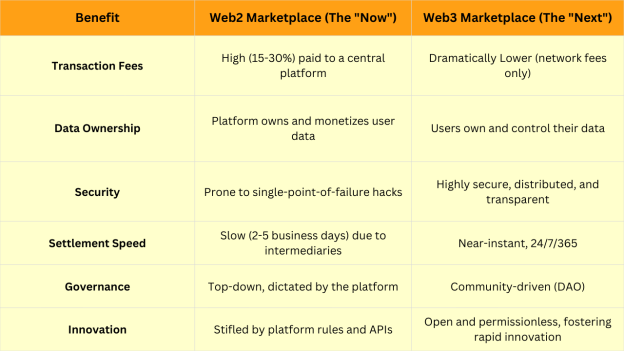
In the sprawling digital bazaars of today, from Amazon to the App Store, a silent tax is levied on every transaction.
It isn't a financial tax, but a "trust tax." We pay it by handing over our data, accepting opaque platform fees, and relying on a central authority to vouch for the person on the other side of the screen. But what if trust wasn't a service you paid for, but a feature baked into the very architecture of the marketplace itself?
This isn't a far-off vision; it's the paradigm shift being driven by Web3 and blockchain technology.
For the forward-thinking CTOs, innovative founders, and strategic enterprise leaders we partner with, this isn't just another tech trend. It's a fundamental reimagining of digital commerce, moving from centrally-controlled platforms to decentralized ecosystems powered by verifiable truth.
It's about shifting the balance of power back to users and creators, opening up unprecedented opportunities for security, transparency, and efficiency.
🔑 Key Takeaways
Bottom Line Upfront: Web3 technologies are dismantling the old model of centralized marketplaces by replacing platform-enforced trust with programmable, mathematically-verifiable trust.
- Decentralization Ends the Dictatorship: By removing the single point of control, Web3 marketplaces reduce censorship risk, lower platform fees, and prevent the vendor lock-in that stifles competition.
- Smart Contracts are Your Automated Escrow: These self-executing contracts automate agreements, ensuring that funds are released only when conditions are met. This drastically reduces fraud and the need for costly human intermediaries.
- Data Sovereignty is the New Standard: In a Web3 world, users own their data. This isn't just a privacy win; it's a commercial one. Users can choose to monetize their data or carry their reputation across different platforms seamlessly.
- Tokenization Creates New Value: Non-Fungible Tokens (NFTs) and other digital assets allow for the provable ownership and transfer of unique goods, be it digital art, a license for a piece of software, or a deed to a virtual property.

The Trust Deficit in Today's Digital Marketplaces
Modern online marketplaces are marvels of scale and convenience. Yet, their centralized nature creates inherent vulnerabilities that every business leader recognizes:
- Monopolistic Control and Exorbitant Fees: Dominant platforms can charge anywhere from 15% to 30% in commission fees. Sellers are at the mercy of arbitrary algorithm changes, policy updates, and the constant threat of de-platforming.
- Rampant Fraud and Counterfeits: Fake reviews, counterfeit products, and fraudulent chargebacks are a multi-billion-dollar headache. The current system relies on reactive, expensive moderation and dispute resolution processes.
- Data Exploitation: User data is the fuel of the Web2 world. Centralized platforms collect, control, and monetize this data, often without transparently compensating the users who create it. Your entire business's customer list could be held hostage by the platform you operate on.
This model is fundamentally inefficient. It requires a massive, costly infrastructure of intermediaries whose primary job is to manufacture trust between strangers.
Enter Web3 and Blockchain: A New Foundation for Trust
Web3 isn't just a new iteration of the internet; it's a new philosophy built on a "trustless" foundation.
That doesn't mean there's no trust. It means you don't have to blindly trust a central entity like Amazon or Apple. Instead, trust is distributed and verified by the network itself through blockchain technology.
A blockchain is, at its core, a shared, immutable ledger. Every transaction is recorded across a network of computers, making it transparent and virtually impossible to alter retroactively.
This architectural shift from a single, private database to a public, distributed one is the source of its power.
Core Web3 Technologies Reshaping Marketplaces
Four key technologies work in concert to build this new generation of marketplaces.
⛓️ Decentralization: Power to the People (and the Profits)
Instead of running on a single company's servers, a decentralized marketplace runs on a network of independent computers.
- Why it Matters: This eliminates the single point of failure and control. No single entity can unilaterally change the rules, take down the platform, or extract excessive fees. Governance can be handed over to the community of users themselves through a Decentralized Autonomous Organization (DAO).
📜 Smart Contracts: The Incorruptible Intermediary
Smart contracts are self-executing agreements with the terms of the deal written directly into code. Think of it as a digital vending machine: you put in a coin (cryptocurrency), and the machine is guaranteed to dispense your product.
- Why it Matters: This automates escrow, royalty payments, and complex multi-party agreements without needing a bank, lawyer, or platform administrator. For a supply chain marketplace, a smart contract could automatically release payment to a supplier once a GPS tracker confirms the goods have arrived at the warehouse. This reduces overhead, speeds up transactions, and eliminates disputes.
🖼️ NFTs and Tokenization: Proving Ownership in a Digital World
A Non-Fungible Token (NFT) is a unique cryptographic token on a blockchain that represents ownership of an asset.
While often associated with digital art, its application is far broader.
- Why it Matters: NFTs can represent ownership of anything: a software license, a concert ticket, a university degree, or the deed to a house. This creates liquid markets for unique digital and physical assets, ensuring provenance and preventing forgery. Imagine an enterprise software marketplace where licenses are sold as NFTs, allowing companies to easily resell unused seats on a secondary market, a new revenue stream created out of thin air.
🛡️ Decentralized Identity & Reputation: You Own Your History
In Web3, your identity and reputation are not tied to a single platform. They are stored in a digital wallet that you control.
- Why it Matters: A seller with a 5-star reputation on one decentralized marketplace can carry that reputation to another without starting from scratch. This breaks down the "moats" that keep users locked into specific platforms and fosters a more competitive and user-centric environment.
Real-World Applications: The Future in Action
This isn't theoretical. Web3 marketplaces are already disrupting industries:
- Decentralized E-commerce: Platforms are emerging that allow sellers to create their own storefronts with near-zero commission fees, connecting directly with buyers. All transactions are peer-to-peer, secured by smart contracts.
- Creator Economies: Artists, musicians, and writers can sell their work directly to fans as NFTs, bypassing the labels and publishers that take a huge cut. Royalties can be programmed into the NFT itself, ensuring the creator gets paid on every future sale automatically.
- Digital Asset Marketplaces: In-game items, virtual real estate in the metaverse, and digital collectibles can be bought and sold in open, transparent marketplaces, owned by the users, not the game developers.

For enterprise businesses, the shift from Web2 to Web3 marketplaces offers clear advantages. Traditional platforms charge steep transaction fees of 15-30%, but Web3 dramatically reduces costs to minimal network fees.
Control over data also flips, while Web2 platforms monetize user information, Web3 lets users own and manage their data, building transparency and trust.
Security and speed improve as well. Centralized platforms are vulnerable to hacks and slow settlements that take days, whereas Web3 runs on distributed systems with near-instant, 24/7 settlements.
Governance becomes community-driven through DAOs instead of top-down control, and innovation accelerates thanks to open, permissionless infrastructure.
- Enhanced Transparency: Smart contracts create tamper-proof records and automate trust.
- New Revenue Models: Token systems enable loyalty, staking, and shared ownership opportunities.
Web3 marketplaces lower costs, strengthen security, speed up transactions, and empower businesses to innovate and grow in a more democratic digital economy.
Navigating the Challenges: A Pragmatic Approach
The transition to Web3 is not without its hurdles. User experience (UX) can be complex, scalability is a continuous area of development, and the regulatory landscape is still evolving.
This is not a "rip and replace" scenario. A successful strategy often involves a hybrid approach, integrating blockchain features into existing systems to solve specific problems like fraud reduction or supply chain verification.
This is where expertise is non-negotiable. Building a secure, scalable, and user-friendly Web3 application requires a deep understanding of blockchain architecture, smart contract security, and the nuances of decentralized infrastructure.
Conclusion: From Platform-Centric to People-Centric
The internet has always been a story of evolving trust. Web1 was about trusting information. Web2 was about trusting platforms.
Web3 is about trusting protocols and mathematics.
For businesses building or relying on online marketplaces, the message is clear: the ground is shifting. The future belongs not to the walled gardens that extract value, but to the open ecosystems that empower it.
By leveraging blockchain, you can build a marketplace with lower costs, higher security, and a more equitable value proposition for everyone involved. This is more than a technological upgrade; it's a strategic imperative for any company looking to lead in the next decade of the digital economy.
❓ Frequently Asked Questions (FAQs)
Q1: Is blockchain technology secure enough for an enterprise-level marketplace?Absolutely. A properly designed blockchain is one of the most secure technologies available.
Its decentralized and cryptographic nature makes it incredibly difficult to tamper with. However, security is paramount in implementation, which is why partnering with experts in smart contract auditing and secure architecture, like the team at Developers.dev, is critical.
Q2: Do my customers need to understand cryptocurrency to use a Web3 marketplace?Not necessarily.
Modern Web3 applications are increasingly abstracting away the complexity. Users can often interact with familiar interfaces, using credit cards or other traditional payment methods, while the blockchain operations happen seamlessly in the background.
The goal is a superior user experience, not a mandatory crypto education course.
Q3: What's the first step to exploring a Web3 solution for my business?
The first step is a strategic consultation. It begins with identifying a key pain point in your current operations, such as high fees, fraud, or lack of data control, that blockchain can solve.
From there, we can help you design a proof-of-concept or a Minimum Viable Product (MVP) to validate the solution and demonstrate ROI before a full-scale implementation.
Q4: How does this impact my company's bottom line?
The impact is direct and significant. By drastically reducing transaction fees paid to intermediaries, you increase your margins.
By automating trust and dispute resolution with smart contracts, you lower your operational overhead. And by creating new, more transparent types of markets, you can unlock entirely new revenue streams.
It's Time to Build the Future of Commerce.
The principles of Web3, decentralization, user ownership, and verifiable trust, are not just ideals; they are powerful business tools.
While your competitors are still grappling with the limitations of centralized platforms, you have the opportunity to build a more efficient, secure, and equitable marketplace.
But you don't have to navigate this complex landscape alone. Developers.dev is your strategic partner in this journey.
Our dedicated Blockchain / Web3 Pod is an ecosystem of over 1,000 in-house experts specializing in building robust, scalable, and secure decentralized applications. We provide the full-stack expertise, from enterprise architecture to smart contract development, to turn your vision into a future-ready reality.


